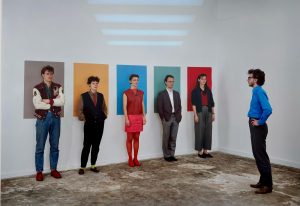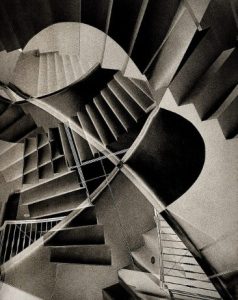English Follows Hebrew
בגלל שהלילה מופע ברכבת שדים
“בגלל שהלילה” הוא מופע שמהלך בין המיסטי והאלגורי, בין מדע בדיוני לזיכרונות קולקטיבים. יש בו משהו מהפראות האפלה שמקננת בקרקסים, באגדות ומיתוסים ומתגלה לעיתים בם בחיי היומיום. התחושה העיקרית שנשארת אחרי הצפייה היא תהייה, ערות מחודדת למציאות שמחוץ לחלל המופע.
שליטה, כוח ואלימות סמויה וגלויה הם נושאים חוזרים. הצפייה נעשית בישיבה ברכבת עשויה קרונות – כסאות מוגבהים ומחוברים הנעים על מסילה בתוך חלל מחולק שני אולמות ונהוגה בידי מייצגנית במסכה חיתית. לא ניתן לרדת בזמן הנסיעה והכנסת מכשירים סלולריים אסורה מה שמשפיע על הריכוז ובמידה רבה גם על אופן הצפייה (ההופך לחלוטין בלתי מתווך). הקהל הוא אכן, למשך קצת פחות משעה, קהל שבוי.

Photo Yair Meyohas
לפרוט את “בגלל שהלילה” לחלקיו אינו עושה אתו צדק משום, שכמו אופרה, מדובר בעבודת אמנות שלמה, כמו במונח הגרמני Gesamtkunstwerk המזוהה עם התפיסות האסטטיות של ואגנר. גיבורי הסיפור שמתגלה בנסיעה הלוך ושוב בין החללים הן דמויות ינשוף, דב, וזאב שלאורך כל המופע אינו מדברות. המקום לא מקום בו הן פועלות הוא יער ערפילי או חדר עירום ובין לבין רואים הצופים גם דמות של מעין אסטרונאוט ופסלים בהיגיון שנע בין היגיון אגדות לסיוט באופן המאיר עד כמה דק הקו ביניהם . ב”בגלל הלילה” האיטצלה של תום שיש פעמים רבות לסיפורי שהם משליי חיות איננה מן הרגע הראשון . העיצוב של המיצב/תפאורה נעשה בידי גבי קריכלי ויש בו את אותה איכות של אמנות הנוגעת בריטואלי שהולכת ומאפיינת את עבודותיו שהוצגו בשנה החולפת . במיצב “שבעה חוקים לחיים” במוזיאון פתח תקווה (אצרה אירנה גורדון), במיוחד בחלק שכונה “גולגולתא” בה יצק כ־400 גולגולות והציב אותן כמו שדה קבורה של דת לא ידועה, ובמשתמע את צליבת ישוע. ב”חד גדיא” בבית האמנים בירושלים (אצרה צופיה דקל כספי) הציג פסל נחש חתוך ומדמם מעין, אוּרוֹבוֹרוֹס (נחש או דרקון הבולע את זנבו) . ב”בגלל הלילה” החיות המואנשות עוברות תהליכי הרס, ואולי, כליה אפוקליפטית עם דרקון המופיע בסוף המופע כמו החיה בחזון יוחנן.

Photo Yair Meyohas
קריכלי יצר רגעים יפיפיים בחלל ההופך להיות יקום עם גלקסיות מסתובבות, כדורי זכוכית צבעוניים שמתוך הלילה והערפל העוטף את המופע עונים על הרעב הנבנה במהלך המופע לצבע נקי. “לילה וערפל ” סרטו של אלן רנה מ 1955 בו הראה תעוד נרחב של אושוויץ ומיידנק הנטושים עולה על הדעת במופע שמעורר זיכרון קולקטיבי עם בגלל התניות – חשיבה על רכבת ובעיקר כזו שאין בה ברירית עלייה או ירידה, הכהות של לילה ובעיקר המטמורפוזה מתמימות – חיות יער חביבות – לזוועה והתחושה של אין מוצא של דין שנגזר שיוצרת המלחמה ההולכת ומתפתחת בין הדמויות. אין למסע ברכבת השדים רגע קתרטי – המסע נפסק אך האלימות והעזובה הנפשית שהוא מתאר אינן מסתלקות.
במאי גיא גוטמן.
גבי קריכלי אשר על כל הצד החזותי במופע.
קבוצת אנסמבל 209 . הכישור 6, יפו
הדרכה והכנה עם ד”ר סמדר שפי
למטיילות/ים עצמאיו/ים לביאנלה בוונציה, 2022
הביאנלה היא אירוע האמנות הבינלאומי החשוב ביותר. השנה מציגות 80 מדינות בביתנים לאומיים ובתערוכה הבינלאומית מציגים 213 אמניות ואמנים.לצד הביאנלה מוצגות עוד עשרות תערוכות חשובות .
במפגש תקבלו רקע והכנה כידי שתנצלו באופן מרבי את הזמן שהחלטתם להקדיש לביאנלה – ותתמקדו בחלקים המעניינים ביותר עבורכן/ם.
ההדרכה עם מצגת ומפות .הביאנלה ננעלת בסוף נובמבר 2022
לפרטים ותאום אנא כתבו מייל ל thewindowartsite@gmail.com
או שלחו הודעת WhatsApp ל 0507431106

Photo Yair Meyohas
“Because the night…”: On a ghost train
“Because the night” is a performance that oscillates between mysticism and allegory, science fiction and collective memories. It has some of the darkness lurking in circuses, legends, and myths, which sometimes reveals itself in daily life. The primary sensation after the performance is wonder and heightened awareness of the reality outside of the performance space.

Photo Yair Meyohas
Covert and overt control, power, and violence are the recurring motifs. Viewers sit in a “train” made of raised seats joined together, moving on a track inside of a space divided into two halls, driven by a performer in an animal mask. The audience cannot disembark from the “train” during the performance, and cellular phones are prohibited, impacting the concentration as well as the viewing: it becomes absolutely unmediated. Those attending the performance, that lasts less than an hour, are truly a captive audience.
A detailed analysis of every detail of the performance does not do it justice because, like an opera, the work is an integral whole, as in the concept “Gesamtkunstwerk” most identified with Wagnerian aesthetics. The wordless protagonists of the story revealed during the travel back and forth between the two spaces are Owl, Bear, and Wolf. Their sphere of action is a dark wood or naked room. Here and there viewers catch a glimpse of a figure of a kind of astronaut or sculptures in the inconsistent logic of fairy tales and nightmares, illuminating just how narrow their dividing line is. In “Because the Night,” the innocence that frequently cloaks animal parables is absent, from the outset. The visual design is by Gabi Kricheli, evoking ritual that has characterized his works exhibited over the past year. In his installation “Seven Rules for Life” (curated by Irena Gordon) at the Petach Tikva Museum of Art – especially the section titled “Golgotha” with its 400 cast skulls placed like a burial area of an unknown religion, resonating the Crucifixion. In “Had Gadya: The Horror Cycle” (curated by Sofia Dekel Caspi) at the Jerusalem Artists’ House, Kricheli exhibited a large cut snake, a kind of Oroboros (image of a snake or dragon swallowing its own tail). In “Because the night,” the personified animals undergo destruction processes, perhaps apocalyptic annihilation, with a dragon appearing at the finale like the creature in Revelations.
Kricheli has created beautiful moments in a space transformed into a universe with revolving galaxies, colorful glass spheres which respond to the increasing hunger for pure color in contrast to the dark night and enveloping fog during the performance. The film by Alain Resnais, Night and Fog (1955), which documented the abandoned concentration camps of Auschwitz and Majdanek camps, comes to mind in this performance which arouses collective memory, perhaps because of conditioned stimuli – thinking about trains, especially when one has no choice of embarking or disembarking, or the dark feelings leading to the war developing between the characters. There is no catharsis on this train journey – the journey ends but the violence and mental negligence it depicts remain.
Director: Guy Gutman
Visual design: Gabi Kricheli
Ensemble 209, 6 HaKishor, Yafo

Photo Yair Meyohas





